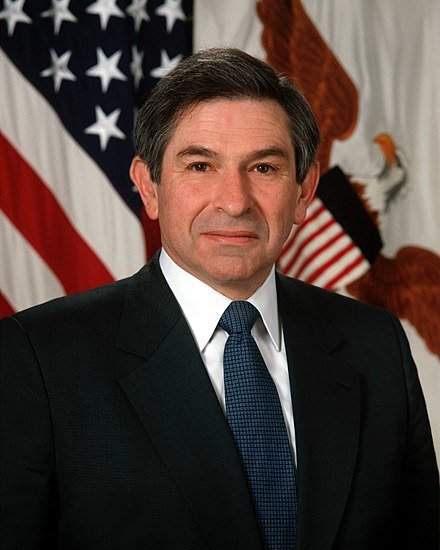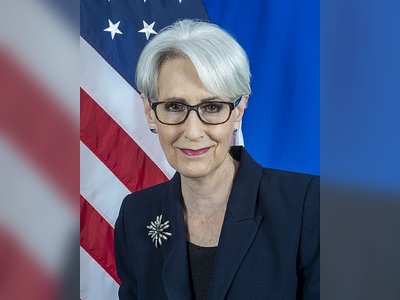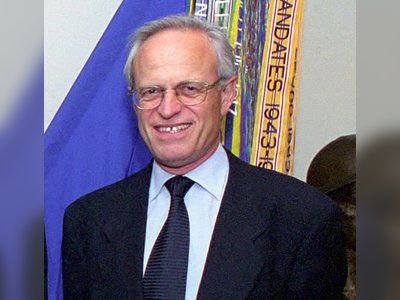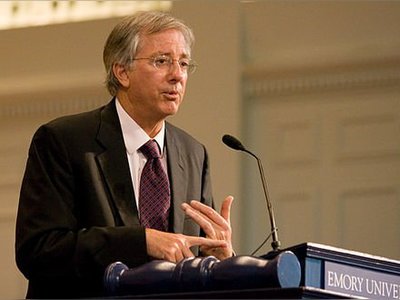מורשת גדולי האומה
בזכותם קיים
beta
Paul Wolfowitz
Paul Wolfowitz's career has been characterized by his significant impact on U.S. foreign policy and international institutions. His role in shaping the "Bush Doctrine" and his leadership at the World Bank have left a lasting mark on American diplomacy and global affairs.
Paul Dundes Wolfowitz (born December 22, 1943) is a Jewish-American diplomat and government official who also served as the President of the World Bank. Prior to his last position, he held the roles of the U.S. Ambassador to Indonesia and the Deputy Secretary of Defense of the United States. Today, he serves as a researcher at the conservative think tank, the American Enterprise Institute (AEI), where he focuses on topics related to international economics, Africa, and public-private partnerships.
As the U.S. Deputy Secretary of Defense, Wolfowitz was one of the prominent architects of the "Bush Doctrine." This doctrine stated that the United States should confront external threats before they materialize, even if it meant taking preemptive military action, and promote democracy in the Middle East to prevent terrorist organizations from finding support. At the end of the first Bush administration, Wolfowitz was appointed as the President of the World Bank. However, after serving in this role for two years, he resigned following revelations that he had facilitated the promotion of his girlfriend within the World Bank. He is fluent in English, Arabic, French, German, Hebrew, and Indonesian.
Paul Wolfowitz was born on December 22, 1943. He was raised in a Jewish-American family, and his background includes a strong emphasis on education and public service. He completed his undergraduate studies at Cornell University and later earned a doctorate in political science from the University of Chicago. These formative years provided him with a strong foundation in academic and analytical thinking.
Even during his academic pursuits, Wolfowitz demonstrated an interest in politics and public policy. His commitment to political engagement became apparent in the 1960s when he became involved in the civil rights movement and participated in the historic March on Washington led by Martin Luther King Jr. This early engagement foreshadowed his future involvement in shaping U.S. foreign policy.
Wolfowitz's government service began in the 1970s when he joined the U.S. Arms Control and Disarmament Agency. Throughout his career, he worked in various government positions, including serving as an Assistant Secretary of State for East Asian and Pacific Affairs under President Ronald Reagan.
However, it was during the administration of President George W. Bush that Wolfowitz rose to international prominence. As the Deputy Secretary of Defense, he played a pivotal role in the aftermath of the September 11, 2001 attacks, helping to shape U.S. foreign policy in the early 2000s. He was a vocal advocate for the invasion of Iraq in 2003, which marked a significant departure from established U.S. foreign policy.
The "Bush Doctrine," closely associated with Wolfowitz, articulated a new approach to U.S. foreign policy. It argued that the United States should act pre-emptively against emerging threats and promote democracy in regions vulnerable to extremist ideologies. This doctrine became a defining feature of U.S. foreign policy during the George W. Bush administration.
After his tenure as Deputy Secretary of Defense, Wolfowitz was appointed as the President of the World Bank in 2005. However, his time at the World Bank was marked by controversy. He faced allegations of improperly advancing the career of his girlfriend, Shaha Riza, within the institution, leading to accusations of favoritism. This scandal ultimately led to his resignation in 2007.
Following his departure from the World Bank, Wolfowitz continued his involvement in policy and research. He joined the American Enterprise Institute (AEI), a prominent conservative think tank, where he focuses on a wide range of international issues, including economics, Africa, and public-private partnerships.
As the U.S. Deputy Secretary of Defense, Wolfowitz was one of the prominent architects of the "Bush Doctrine." This doctrine stated that the United States should confront external threats before they materialize, even if it meant taking preemptive military action, and promote democracy in the Middle East to prevent terrorist organizations from finding support. At the end of the first Bush administration, Wolfowitz was appointed as the President of the World Bank. However, after serving in this role for two years, he resigned following revelations that he had facilitated the promotion of his girlfriend within the World Bank. He is fluent in English, Arabic, French, German, Hebrew, and Indonesian.
Early Life and Education
Paul Wolfowitz was born on December 22, 1943. He was raised in a Jewish-American family, and his background includes a strong emphasis on education and public service. He completed his undergraduate studies at Cornell University and later earned a doctorate in political science from the University of Chicago. These formative years provided him with a strong foundation in academic and analytical thinking.
Early Career and Political Involvement
Even during his academic pursuits, Wolfowitz demonstrated an interest in politics and public policy. His commitment to political engagement became apparent in the 1960s when he became involved in the civil rights movement and participated in the historic March on Washington led by Martin Luther King Jr. This early engagement foreshadowed his future involvement in shaping U.S. foreign policy.
Government Service
Wolfowitz's government service began in the 1970s when he joined the U.S. Arms Control and Disarmament Agency. Throughout his career, he worked in various government positions, including serving as an Assistant Secretary of State for East Asian and Pacific Affairs under President Ronald Reagan.
However, it was during the administration of President George W. Bush that Wolfowitz rose to international prominence. As the Deputy Secretary of Defense, he played a pivotal role in the aftermath of the September 11, 2001 attacks, helping to shape U.S. foreign policy in the early 2000s. He was a vocal advocate for the invasion of Iraq in 2003, which marked a significant departure from established U.S. foreign policy.
The Bush Doctrine
The "Bush Doctrine," closely associated with Wolfowitz, articulated a new approach to U.S. foreign policy. It argued that the United States should act pre-emptively against emerging threats and promote democracy in regions vulnerable to extremist ideologies. This doctrine became a defining feature of U.S. foreign policy during the George W. Bush administration.
World Bank Presidency and Resignation
After his tenure as Deputy Secretary of Defense, Wolfowitz was appointed as the President of the World Bank in 2005. However, his time at the World Bank was marked by controversy. He faced allegations of improperly advancing the career of his girlfriend, Shaha Riza, within the institution, leading to accusations of favoritism. This scandal ultimately led to his resignation in 2007.
Current Work and Legacy
Following his departure from the World Bank, Wolfowitz continued his involvement in policy and research. He joined the American Enterprise Institute (AEI), a prominent conservative think tank, where he focuses on a wide range of international issues, including economics, Africa, and public-private partnerships.
- פול וולפוביץhe.wikipedia.org






